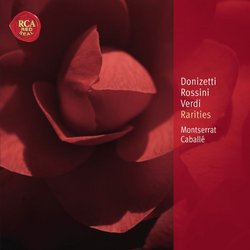| All Artists: Leslie Fyson, Gioachino Rossini, Gaetano Donizetti, Giuseppe Verdi, Carlo Felice Cillario, Anton Guadagno, Corinna Vozza, Maja Sunara, RCA Italiana Opera Orchestra, London Symphony Orchestra, Montserrat Caballé, Margreta Elkins, Ermanno Mauro, Lajos Kozma Title: Rarities: Donizetti, Rossini, Verdi Members Wishing: 0 Total Copies: 0 Label: RCA Release Date: 10/12/2004 Album Type: Original recording remastered Genres: Pop, Classical Styles: Vocal Pop, Opera & Classical Vocal, Chamber Music, Historical Periods, Classical (c.1770-1830) Number of Discs: 1 SwapaCD Credits: 1 UPC: 828766230925 |
Search - Leslie Fyson, Gioachino Rossini, Gaetano Donizetti :: Rarities: Donizetti, Rossini, Verdi
 | Leslie Fyson, Gioachino Rossini, Gaetano Donizetti Rarities: Donizetti, Rossini, Verdi Genres: Pop, Classical |
Larger Image |
CD Details |
CD ReviewsMontserrat Caballe's Claim To Fame Rudy Avila | Lennox, Ca United States | 11/09/2005 (5 out of 5 stars) "Bel canto opera was soprano Montserrat Caballe's claim to fame. Blessed with both a huge and lyrically resplendent voice, she was a refreshing change from the purely dramatic style of singing provided by Maria Callas. Her pianissimi are still talked about even long after they disappeared, her coloratura is dynamic, her stamina and breath control impressive and her orutund, vigorous but beautiful tone made her particularly suited for the roles of queens or strong women- Donizetti's Lucrezia Borgia and Bellini's Norma especially. The other reviewer says she was perfect for the roles of mothers, queens and wives, and this is true because she was able to portray seemingly powerful women dying of love underneath. She would have made an exceptionally terrific Turandot but she never sang the role in her career.Her career in opera spanned the decades of the 60's, 70's and even part of the 80's. The arias from Parisina and Torquato Tasso are indeed outstanding. These operas are obscure bel canto operas by Donizetti, Rossini and even early Verdi operas. These operas will never be staged again and some of them enjoyed only mild success in their original stage premieres in the 19th century. This is the work of young and energetic composers who had not yet mastered character insight and thrilling dramatic elements. Mostly, it's beautiful singing, the actual definiton of the term bel canto. What we get in place of dramatic potency is ornate, lush singing. In the very least, these arias should be sung in recital. Caballe sang numerous bel canto pieces in recital, displaying her gift for this type of singing. She is the very embodiment of bel canto. Not even Joan Sutherland and Beverly Sills, considered her fellow peers in the same "back to bel canto" movement could essay the arias with such grace, elegance and majestic beauty. Sutherland sang with obvious gloss and no real dramatic power, Sills sang beautifully but focused on the significance of text as drama and therefore "spoke" some of her lines or cried or raged instead of singing. Callas was the same way only hers was a bigger voice. Caballe gave us simply beautiful singing. And we thank her for that." Rare and glorious music, gloriously sung adorian | 11/13/2007 (5 out of 5 stars) "This seems to be a compilation of Caballe's three early LPs. A lot of the music was very rare at the time, especially the Donizetti. Some of the early Verdi was also unknown to me until I heard her fabulous renditions thereof. My favorite is the cavatina/cabaletta from Donizetti's "Torquato Tasso," two brilliantly memorable tunes that always leave me humming the melodies for hours and days. Caballe's ravishing sound has never been better: the gorgeous legato, the phenomenal breath control, the floating high pianissimi. This was one of the most amazing voices of our time, and this two-disc set is a perfect reminder of why she was without equal in this rare Donizetti repertory. There is one slight problem with this set. When you put disc two into a computer, the info comes up for disc one, and you will think that you have two copies of disc one and no disc two. If you put it into a CD player, you won't know the difference, but I put it in the computer and couldn't figure out why the read-out for disc two was the same Rossini stuff as disc one, and I made a fool of myself by contacting people complaining about having two disc twos and no disc one. I later realized my mistake...and the computer "programmer's." Live and learn." No news Canzone | California | 02/20/2006 (4 out of 5 stars) "If you have the earlier release of this set (1992 I think), there's really no need to replace it. This current (2004) release was supposedly remastered, but I can hear little if any difference. Amazon shows both versions, but I'd bet the earlier one may well be out of print. You get all the Caballe trademarks here: floated pianissimos, gorgeous mid-range singing - and the usual glottal stops. Even if you're not a big MC fan, the set is worth getting for all those arias you're not likely to hear elsewhere, or done as well."
|
